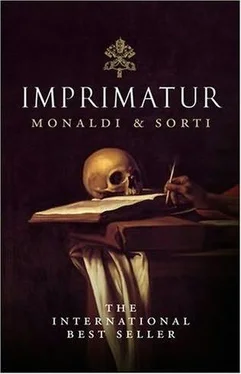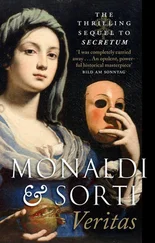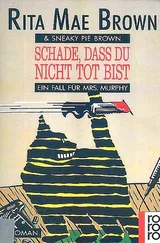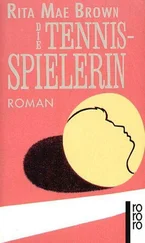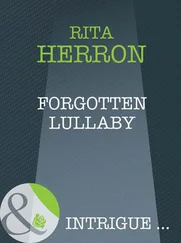Rita Monaldi - Imprimatur
Здесь есть возможность читать онлайн «Rita Monaldi - Imprimatur» весь текст электронной книги совершенно бесплатно (целиком полную версию без сокращений). В некоторых случаях можно слушать аудио, скачать через торрент в формате fb2 и присутствует краткое содержание. Жанр: Исторический детектив, на английском языке. Описание произведения, (предисловие) а так же отзывы посетителей доступны на портале библиотеки ЛибКат.
- Название:Imprimatur
- Автор:
- Жанр:
- Год:неизвестен
- ISBN:нет данных
- Рейтинг книги:5 / 5. Голосов: 1
-
Избранное:Добавить в избранное
- Отзывы:
-
Ваша оценка:
- 100
- 1
- 2
- 3
- 4
- 5
Imprimatur: краткое содержание, описание и аннотация
Предлагаем к чтению аннотацию, описание, краткое содержание или предисловие (зависит от того, что написал сам автор книги «Imprimatur»). Если вы не нашли необходимую информацию о книге — напишите в комментариях, мы постараемся отыскать её.
Imprimatur — читать онлайн бесплатно полную книгу (весь текст) целиком
Ниже представлен текст книги, разбитый по страницам. Система сохранения места последней прочитанной страницы, позволяет с удобством читать онлайн бесплатно книгу «Imprimatur», без необходимости каждый раз заново искать на чём Вы остановились. Поставьте закладку, и сможете в любой момент перейти на страницу, на которой закончили чтение.
Интервал:
Закладка:
The objection had the effect of creating hesitancy on the part of the men-at-arms, who besought the innkeeper with their eyes. The latter had, however, not even heard the physician's request: slumped on a chair, plunged in dejection, he groaned and uttered imprecations, as was his wont, against the innumerable torments which life inflicted upon him. The last of these had been when, scarcely a week earlier, a small crack had appeared in one of the walls of the inn, no rare occurrence in the old houses of Rome. The fissure entailed no danger whatever, so we were told; yet it was more than enough to engender in my master both melancholy and rage.
Meanwhile, the roll-call continued. Evening shadows were lengthening and the officers had decided to admit of no further delay with the closure.
"Domenico Stilone Priaso, from Naples! Angiolo Brenozzi, from Venice!"
The two young men, the former a poet, the latter a glass-blower, stepped forward, looking at one another, seemingly relieved to be called up together, almost as though that lessened the apprehension. Brenozzi, the glass-blower-with fearful expression, his shining brown curls and small turned-up nose like a hillock between blushing cheeks-resembled a little porcelain Christ Child. What a pity that, as was his habit, he relieved himself of nervous tension by pinching obscenely the celery stem that lay between his thighs, almost as though he were plucking a one-stringed instrument. A vice which caught my eye more than anyone else's.
"May the Most High assist us," sobbed Robleda at that moment; whether in disapproval of the glass-blower's misplaced gesture or be- weeping our plight, I knew not; and he let himself collapse, purple in the face, onto a stool.
"And all the saints," added the poet, "for I have come from Naples to catch the infection."
"And you did not do well," responded the Jesuit, wiping the sweat from his brow with a handkerchief. "You had only to remain in your own city, where the opportunities for contagion are not lacking."
"Perhaps so. And here, now that there is a good Pope, we believed we enjoyed the favours of heaven. But first we must see what those think who are, as they say, behind the Porte," whispered Stilone Priaso.
Tight-lipped and sharp-tongued, the Neapolitan poet had struck where none wished so much as to touch.
For weeks now, the Turkish army of the Ottoman Sublime Porte had been pressing at the gates of Vienna, thirsty for blood. All the Infidel hosts were converging implacably (or so the bare accounts that reached our ears would have it) on the capital of the Holy Roman Empire, and threatened soon to burst through its bastions.
The warriors in the Christian camp, almost on the point of capitulating, resisted only thanks to the power of the Faith. Short of arms and victuals, reduced by famine and dysentery, they were moreover terrorised by the first signs of an outbreak of the plague.
All knew that if Vienna were to fall, the armies of Kara Mustapha would have free passage to the West. And they would spread everywhere with blind and terrible joy.
To ward off the threat, many illustrious kings, princes and captains had mobilised: the King of Poland, Duke Charles of Lorraine, Prince Maximilian of Bavaria, Margrave Ludwig-Wilhelm of Baden, and others too. Almost all had been convinced to fly to the assistance of the besieged by the one true Bulwark of Christendom, Pope Innocent XI.
The Pontiff had, indeed, struggled long and strenuously to league together, gather and strengthen the armies of Christendom. And this he had done, not only by political means but also through precious financial support. From Rome there departed continuously generous sums of money: over two million scudi to the Emperor, five hundred thousand florins to Poland, more than a hundred thousand scudi donated by the nephew of the Pontiff, other subscriptions by individual cardinals and, lastly, a generous extraordinary levy on the ecclesiastical tithes of Spain.
The Holy Mission which the Pontiff was desperately seeking to accomplish followed upon innumerable pious works wrought during the seven years of his Pontificate.
Now aged seventy-two, the successor of Saint Peter, born Benedetto Odescalchi, had above all set the example. Tall, very thin, broad of forehead, with an aquiline nose, severe of mien, his chin prominent yet noble, wearing goatee and mustachios, he had gained renown as an ascetic.
Shy and reserved in character, he was but rarely to be seen riding in a carriage through the city, and took care to avoid popular acclamations. It was noted that he had chosen for himself the smallest, barest and most inhospitable apartments that ever a Pontiff inhabited, and that he almost never descended into the gardens of the Quirinale or the Vatican. He was so frugal and parsimonious as only to wear the habits and vestments of his predecessors. From the time of his election, he always wore the same exceedingly threadbare white cassock, and changed it only when it was pointed out to him that too negligent a dress ill-befitted the Vicar of Christ on earth.
Likewise, he had acquired the highest merit in the administration of the Church's patrimony. He had restored order to the funds of the Apostolic Chamber which, since the bad times of Urban VIII and Innocent X, had suffered all manner of robbery and fraud. He had abolished nepotism: no sooner was he elected than he summoned his nephew Livio, warning him-so it was said-that he would not have him made a cardinal, nor would he be allowed near the affairs of state.
Moreover, he had at last recalled his subjects to more austere and temperate usages. The theatres, places of disorderly entertainment, were closed. The Carnival which, only ten years earlier, had attracted admirers from all over Europe, was all but dead. Musical festivities and divertissements were reduced to a minimum. Women were forbidden to wear dresses too open and decollete after the French fashion. The Pontiff had even sent forth bands of police spies to inspect the laundry hanging from the windows and confiscate any over-audacious bodices or blouses.
It was thanks to such austerity, both financial and moral, that Innocent XI had been able laboriously to raise money to combat the Turks, and great had been the succour given to the cause of the Christian armies.
But now the war had reached the critical moment. And all Christendom knew what to expect from Vienna: salvation or disaster.
So the people were in dire distress, at every sunrise looking to the East and wondering whether the new day would bring with it swarms of bloodthirsty janissaries and chargers thirsting to drink from the fountains of Saint Peter's.
This, then, was what the squabble between the Jesuit and the poet had touched upon: a terror that ran through the town like an underground river.
The repartee of Stilone Priaso had piled fear upon fear in the already sorely tried spirit of Padre Robleda. Grim and trembling, the Jesuit's round face was framed by the angry pressure of the cushion of fat that danced beneath his chin.
"Is someone here of the Turkish party?" he gasped maliciously.
All those present turned instinctively towards the poet, whom a suspicious eye might easily have taken for an emissary of the Porte: brown, pockmarked skin, small eyes like coals, and an owl-like frown. His dark silhouette reminded one of those robbers with thick, short hair who are, alas, all too often to be encountered on the road to the Kingdom of Naples.
Stilone Priaso had not the time to reply.
"Silence, once and for all!" hissed one of the gendarmes, continuing the roll call.
"Signor di Mourai, from France, with Signor Pompeo Dulcibeni from Fermo, and Roberto Devize, French musician."
The first name called was, as my master Signor Pellegrino hastened to explain, that of the old Frenchman who had arrived in the
Читать дальшеИнтервал:
Закладка:
Похожие книги на «Imprimatur»
Представляем Вашему вниманию похожие книги на «Imprimatur» списком для выбора. Мы отобрали схожую по названию и смыслу литературу в надежде предоставить читателям больше вариантов отыскать новые, интересные, ещё непрочитанные произведения.
Обсуждение, отзывы о книге «Imprimatur» и просто собственные мнения читателей. Оставьте ваши комментарии, напишите, что Вы думаете о произведении, его смысле или главных героях. Укажите что конкретно понравилось, а что нет, и почему Вы так считаете.
